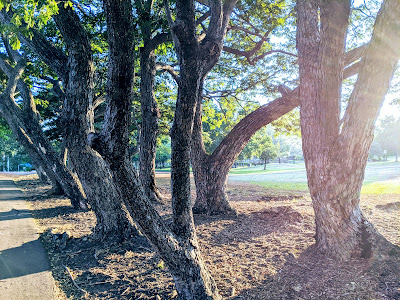After 3 three days of enacting a forced repetitive activity, I am starting to feel obsessive. I have a clear mind, however, I am annoyed by not being able to achieve other to-do duties of the day. Not that walking through Jingili Water Gardens is overbearing. I am finding it pleasurable. The oxygen is clean, birds are singing, people are greeting and the temperature is wonderful. What I am finding obsessive is that writing a reflection is time-consuming. So to alleviate this pressure I am restricting my reflection from a daily event to incorporating two days of walking through Jingili Water Gardens into one reflection.
- Do I feel driven to engage in one reflection per activity? Yes.
- Do I feel anxiety and guilt for not achieving my goal? Yes.
- Did I underestimate the commitment? Yes.
In three days I lost control of my task and had to reprocess how I am to achieve purpose without repurposing or letting go. My holiday intention was to not 'just do it' with the purpose of performing an activity that bridges yesterday, today, and tomorrow. That is a bridge I have identified to assist in gaining creative insight.
In regards to simultaneously observing my thinking and my thoughts about my thinking, I have realized a subset that underlies my problem. My day three and four walks around Jingili Water Gardens were more or less the same, however not exactly the same. The people involved are becoming real. Certain people appear at the same location every second day. Others appeared further along or behind their point of interaction. I even noted an individual's loop point. In each iteration, my behavior is normalizing. It is no longer a question on whether I say "good morning". It is now a question of whether I maintain expectations.
My Jingili Water Gardens walk now includes cognitive empathy. That is, I am thinking about my interaction and the third person's interaction. Does the push-bike rider evade me, or do I demonstrate prior evasion? Do I stand ground, step aside, smile, or frown based on their physical conveyance. Then once demonstrated, do we both accept the contract is as ongoing?
This cognitive realization gained by employing repetition, questions my good as well as the good of combined interactions and that of the third person initiative. Each small smile or frown can be quickly established as the norm, however, each interaction occurs in a slightly different place along the path. Does this mean that each interaction with the same person can be influence by where and when? Then if I alter my reaction to each location am I distorting my emotional empathy to confuse the comforts of repetition? Do I maintain consistency for the satisfaction of sameness disregarding the actual difference?
My thoughts are now questioning the identification of purpose. If I ignore the interactions I ignore my intention of gaining understanding through repetitive activity. Are fleeting interactions as important as the actual length and time of walk? Likewise, are the inhabiting people of the tourist location as important as the UNESCO world heritage site? Underneath this reflection is whether my cognitive gain of completing an activity of the intended activity or is it the minor and fleeting people interactions within the activity, the gained merit?
Thinking about this problem could be part of the creative problem I started with. In short, my problem could be someone else's perspective. Rather than trying to solve my problem through my cognitive questioning, I should apply my interpretation of other people's thinking of me.
If I am to stay focussed on repetitive behaviors I may need to self-reflect as someone else rather than being self-focussed. This could be a formal way of letting myself into myself as a third person. Can I become inclusive of myself through a base of problem-solving myself? Constructing a user-friendly approach that pays attention to my cognitive misunderstandings and emotional positioning on the service/products that I create. That is collaborating with myself as a third person(s).

You Tube










Comments
Post a Comment